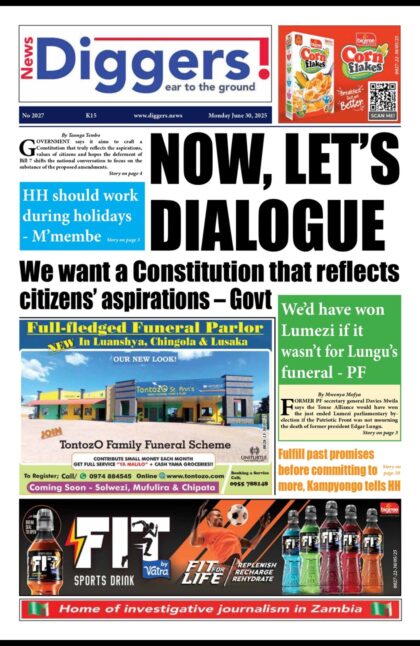Bridges Limited managing consultant Chibamba Kanyama says the Cholera outbreak is likely going to affect the targeted 2018 economic growth as a result of reduced revenue collections by the Zambia Revenue Authority.
In a statement sent to News Diggers, Chibama onbserved that investors may also begin to worry if government increases borrowings from various markets to finance strategies aimed at containing cholera which in turn may also affect Foreign Direct Investment.
“The only way that FDI is going to be affected is if the impact of spending towards the cholera outbreak worsens the existing fiscal deficit, which should not be the case right now given measures government has put in place to contain it. But unplanned spending by government to contain the epidemic; reduced revenue collections by the Zambia Revenue Authority given the recent experiences where supermarkets were closed because these are largely collection points for Value Added Taxes (VAT); low productivity arising from fewer employees going to work to reduce public gatherings as well as lack of outlets for agricultural products following the closure of Soweto and other key markets, can all affect FDI in some way,” Kanyama stated.
He stated that the outbreak of cholera was most likely going to affect the overall economic output for 2018 and that the country may end up with a lower economic growth rate by the end of the year.
“The factors indicated herein will most likely affect overall economic output for 2018 and we may end up with a lower than the 3.8 projected economic growth rate by end of year. Worse still, if government increases borrowings from the domestic or even foreign markets to finance the strategies aimed at containing cholera, then that may begin to worry investors. However, as things stand, it would take real serious damage to the economy and its infrastructure to hurt investor prospects. What is of primary concern to investors is predictability of the policy environment including foreign exchange management and favourable taxation policies), competitive markets in which consumer spending is favourable, overall economic stability in terms of exchange rates, inflation and fiscal position as well as politics,” Kanyama stated.
Meanwhile, Kanyama expressed concern over the country’s debt stock and if it was possible to resume the IMF program discussion to bailout Zambia again.
“My only real worry for the country is that the fourth quarter of 2017 showed moderate recovery for the country. Zambia Revenue Authority reported to have beaten budget revenue by over K1 billion, debt to GDP ratios having dropped from 60 per cent to end at about 56 per cent, the bond yield on the international market appearing to attract better investment and deficit to GDP dropping to about 5.8 percent from 7.5 percent. The treasury bills were in December oversubscribed, an indication of good liquidity in the market.”
“All things remaining equal, with the expected announcement by the Minister of Finance Felix Mutati about Zambia’s final debt position in 2017, and the implementation of debt contraction laws, we may actually see the resumption of the IMF program discussion. What stands in the way of a stable economic outlook for the country in 2018 is cholera… spending outstretching the health budget, productivity affected, VAT revenue streams following temporary closure of supermarkets affected. This will certainly have a dent; what more if the rains delay and farmers do not produce? As much as we know most of them have not even planted due to delayed distribution of inputs,” stated Kanyama.



















